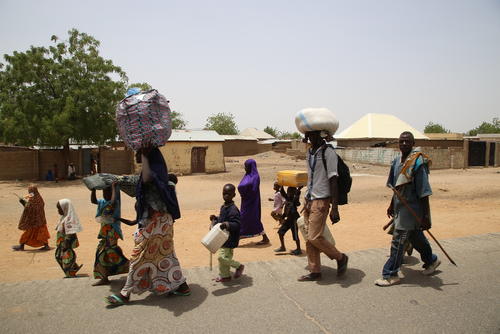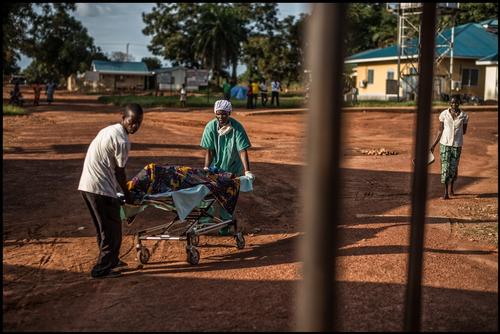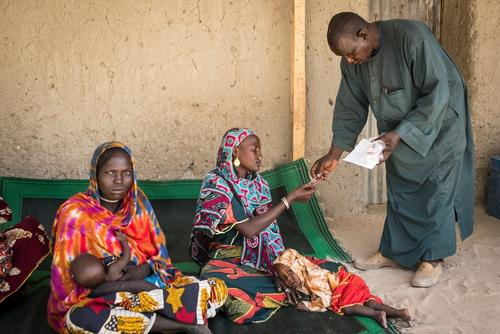Hundreds of thousands of people have been displaced by the conflict between Boko Haram and the Nigerian armed forces in the northeast of the country. Some of them have already lived for years in temporary homes. Others are on the move from one place to another. All of them recount a life full of hardships in search of a glimmer of hope. These are some of their stories in the towns of Pulka and Banisheikh, Borno state, Nigeria.
“By the time we left, we had suffered a lot; we were very scared. It took us two days to get here by foot, after we slept overnight in the bush. Some of the people we travelled with passed away on the journey. Some of our children died of thirst as we didn’t have any water.” Falmata is a 35 year-old woman from Shetimari, in the northeastern Nigerian state of Borno. She recalls the beginning of the trip that took her away from her village. That was four years ago, in the midst of a conflict between the Nigerian armed forces and Boko Haram, which today has left nearly two million people displaced across the country and several hundred thousand refugees settled in neighbouring countries around the Lake Chad region, including Niger, Cameroon and Chad.
Falmata is one of those who has lost almost everything. The journey brought her to the town of Banisheikh, about 90 minutes by car to the west of the state’s capital, Maiduguri. “We settled here because we thought it was a safer place.” A lot of people were killed in her village, including three of her relatives. Boko Haram members would come on motorbikes and rob their belongings; some women were subjected to forced marriages, and other girls disappeared. “We don’t think it is safe enough to go back there yet.”
Falmata has moved from one camp to another in Banisheikh with her husband and seven children. The displaced community has grown and most now live in five settlements, sheltered only by flimsy plastic sheeting, supported with pieces of wood and stalk. These tiny spaces, in which they cook, sleep and spend most of their time, become terribly hot during Borno’s summer; when it rains, the plastic shelter leaks, and strong winds can rip holes in it. Sometimes the timber becomes infested with termites, damaging the frames, and causing the shelter to collapse.
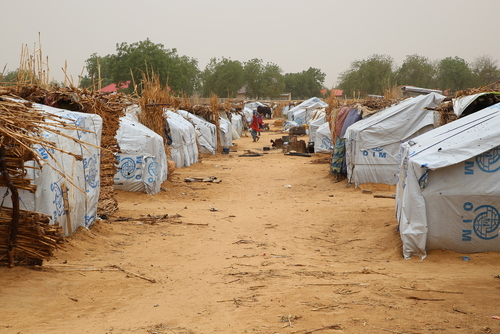
Unlike many roads across Borno, where movements can only be made with military escorts, traffic along the road from Banisheikh to Maiduguri has long been re-established. Numerous checkpoints serve a reminder of the volatility of a place that is a recurrent crossing point for insurgents coming from the Sambisa forest in the southern part of Borno state, heading north to Niger.
Over the past few months, following the escalation of the fighting, the Nigerian army has taken control of some towns in Borno. The clashes between the army and Boko Haram are forcing people to be displaced in all directions on a constant basis. People often have no choice but to leave their villages in the rural areas, sometimes separating from their relatives, and move to bigger towns where humanitarian agencies are concentrated. Aid is not reaching some inaccessible areas, and little information is emerging from these places. Pulka, close to the border with Cameroon, currently has around 60,000 to 70,000 people, but has seen its population increase considerably since the beginning of the year. New arrivals occur daily or weekly, to such an extent that humanitarian organisations now fear that the place is not fit to host many more people, particularly due to shortages of drinking water and insufficient shelter.
“When people arrive, they have very few belongings. The vast majority are women and children, as well as some elderly people,” says Sabina Mutindi, medical programme manager of Médecins Sans Frontières (MSF) in Pulka. “The young generation of men is completely missing,” adds Mutindi. Some of them may have died in the conflict, others may have joined the ranks of Boko Haram. “We see every possible medical case. The patients are hypoglycaemic, exposed to a harsh environment, so they have respiratory tract infections, ulcers, high blood pressure”. Once in Pulka, the fight is for survival.
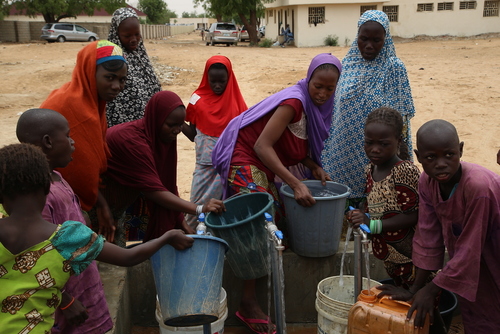
Despite all the hurdles, for others, going to Pulka is a relief. Some had left the town when Boko Haram took over and have been in Cameroon for the last few years. Since May, the return of Nigerian refugees from Cameroon to Nigeria has intensified, with people leaving Cameroon because of the conditions in the camps where they were seeking refuge. However, they are also heading to places where services are limited. “We were told that we would be brought back to Nigeria, so we decided to come on our own. I decided to come to Pulka because it is my hometown,” says Adama, a 25 year-old woman and mother of four children, who had been living in Minawao camp in Cameroon for the last two years, until early May.
However, the return to Nigeria was not easy; during the journey, she had to cross a river and some people died when the canoe they were using capsized. “In Minawao, life was not easy. The information we received was that things in Pulka were better.” Upon her arrival, Adama found out that the food reservoirs and cattle stock she had left in the house she was renting in Pulka had disappeared, as well as all her other belongings. As a result, she moved into a health centre compound where MSF is running a hospital, and which is currently hosting around 2,000 displaced people and returnees who have not been given tents. “People need to assist us with aid,” says Adama.
MSF has been working in Maiduguri in Borno state since August 2014. The organisation is currently managing 11 medical facilities in six towns in Borno (Maiduguri, Ngala, Monguno, Gwoza, Pulka and Banisheikh) and regularly visits another five towns: Bama, Banki, Dikwa, Damasak and Rann.



